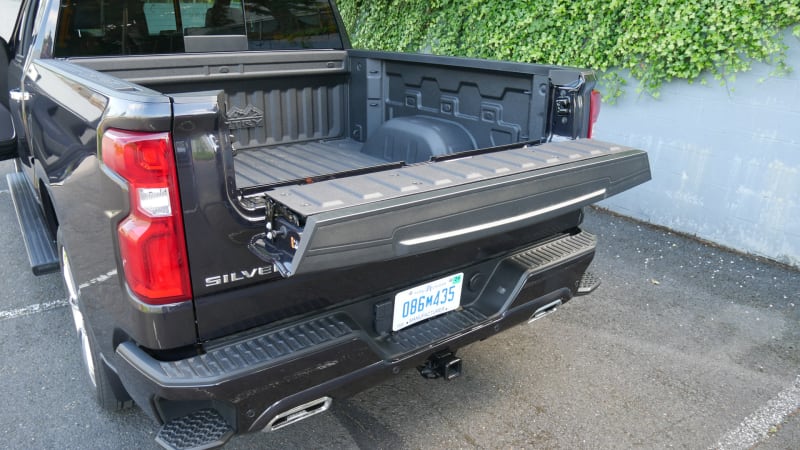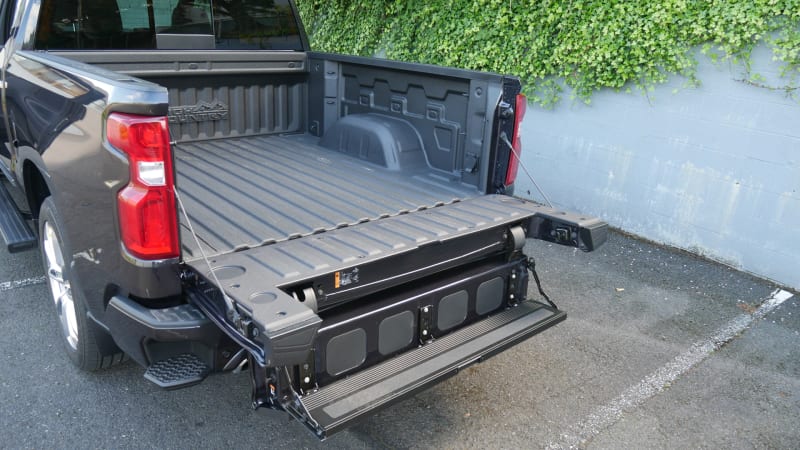Pros: Lovely interior in most trims (how about that!); whisper-quiet diesel; useful MultiPro tailgate; responsive handling
Cons: Rougher ride than competitors; no hybrid or electric option (yet)
The 2023 Chevrolet Silverado gets only minor updates, but really, who cares? Chevy did so much heavy lifting last year that it deserved to kick back and take some R and R after such a thorough update and improvement of the Silverado. Specifically the interior, which went from an embarrassment to arguably the finest cabin in the segment in terms of overall aesthetic appeal (Ram may still have an advantage in terms of materials quality and functionality). Even a Silverado LT volume seller looks and feels luxurious now, while the genuinely luxurious High Country wows with its open-pore wood trim and distinctive navy blue leather option. Both are pictured in the above gallery.
As for the rest of the truck, Chevy’s Duramax diesel engine is now even more impressive thanks to increased output for 2023 and the fact that it’s so darn quiet. We’re not exaggerating when we say you’d be hard pressed to tell it’s a diesel. You’ll definitely tell the base 2.7-liter turbo-four isn’t a big, burly V8, but that’s OK as it has the performance and fuel economy to make up for it. As for the big, burly V8s, they definitely get the job done, but we ultimately prefer Ford and Ram’s big engines.
We also prefer driving those trucks in general. While the Silverado impresses with its responsive steering and overall handling, its ride quality is not as comfortable nor as refined as Ford and especially Ram offers. It behaves more like a truck overall – a Ram 1500 can often feel like a family crossover. We’re guessing many Silverado devotees won’t care too much, but should you be using your full-size truck as a daily driver, it’s something to be aware of and we suggest driving the various trucks back-to-back to experience the difference for yourself.
Interior & Technology | Passenger & Cargo Space | Performance & Fuel Economy
What it’s like to drive | Pricing & Trim Levels | Crash Ratings & Safety Features
What’s new for 2023?
After massive, substantial upgrades last year, the Silverado receives only minor updates for 2023. The Duramax diesel engine receives a bit more horsepower and torque thanks to various upgrades and refinements, while the High Country trim level gets a Jet Black/Umber interior color option. There are also three new paint colors.
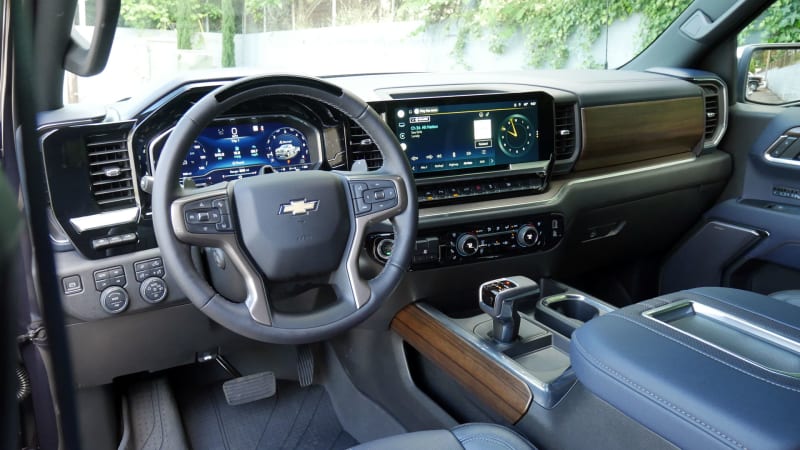

What are the Silverado interior and in-car technology like?
Last year saw the Silverado get a completely new interior design with updated materials starting with the LT trim (those lower retain the ugly old interior design). It’s a massive improvement and the thoroughly modern interior this thoroughly modern truck should’ve had from the very beginning. Although we were very impressed by how nice the LT trim level is (pictured above, top), it’s the upper trim levels that benefited most from last year’s overhaul – because they absolutely needed it. For instance, instead of a few bits of unconvincing wood trim slapped randomly to the side of the High Country’s center console, the new version (above, bottom left) gets the real deal, and it feels just as good as it looks. Heck, the LT has a far more premium vibe than the old High Country did.
Note that the Work Truck, Custom and Custom Trail Boss trim levels still have the old interior with an 8-inch touchscreen (pictured above, bottom left). This is less of an issue at a lower price point and for trucks with a more rough-and-tumble purpose. You can see the difference between them all above.
Besides aesthetics, the overhaul included a 13.4-inch infotainment screen and 12.3-inch instrument display, albeit with different skins and software suites to account for differing options. The digital gauge cluster is bright, crisp, and doesn’t wash out even in bright sunlight. We appreciate the 13.4-inch touchscreen’s widescreen orientation as it easily allows you to see and operate multiple screens at once, and also lends itself to a more attractive design (although the right side of the screen is quite a reach). The infotainment system is also among the first in the industry to run on the Android Automotive operating system. It generally works well and is easy to figure out, but doesn’t represent an advantage over Ford and especially Ram. Note that if you’re an Apple user, don’t worry. Apple CarPlay is fully supported, along with Android Auto.
Although it’s technically outside the truck, this seems like a good place to note that the Silverado has higher bed walls than other trucks, plus the option of the exceptional MultiPro tailgate that provides various functional upgrades and features over a traditional one-piece tailgate. Quite simply, it makes it so much easier to load and unload the bed.
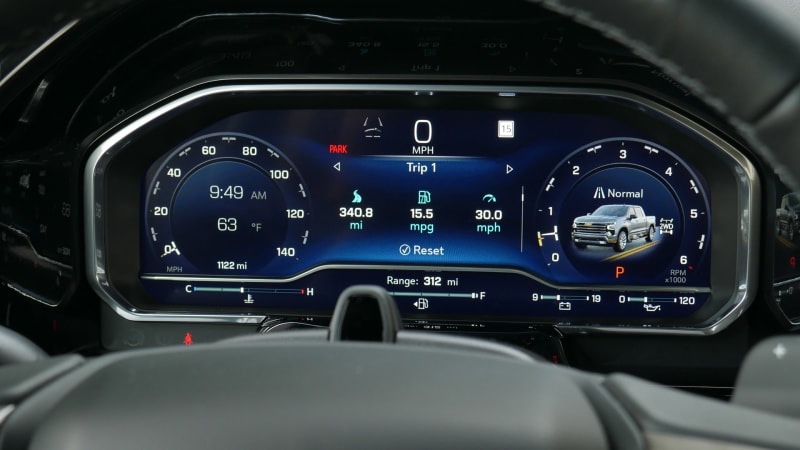
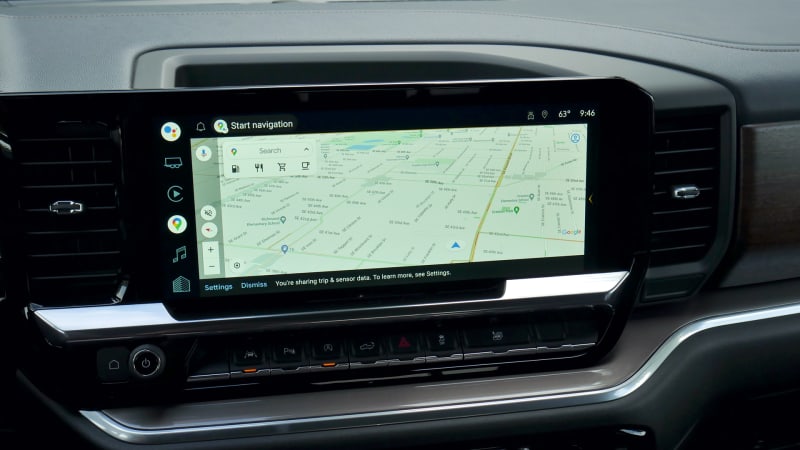
How big is the Silverado?
It’s huge. But so are all full-size pickups today. There are three cab configurations: a two-door Regular Cab with an 8-foot bed, a Double Cab with four doors and a 6.5-foot bed, and the larger Crew Cab four-door with either a 6.5-foot or a 5.8-foot bed. The Regular Cab measures 229.5 inches from stem to stern, while the Double Cab and the Crew Cab short box are just two inches longer, and the Crew Cab long box tacks on another 10 inches. The off-road ZR2 version is sold only as a Crew Cab with the short box.
The Silverado features higher bed sides than most competitors, allowing Chevy to claim greater cargo volume. You can also get it with GM’s Multi-Flex tailgate shown above left. Payload ranges from 2,130 pounds for the 4×4 Crew Cab to 2,280 for the 4×2 Regular Cab. Buyers who would routinely max out the payload, however, should look instead at the Silverado HD.
The vast majority of Silverados sold are the four-door Crew Cab configuration, which has sprawl-out space in the rear seat. The rear seat cushion also can flip up to help when carrying cargo inside. Access is easy through huge doors, although it’s a climb up to get inside (more so on the off-road-themed variants with their raised suspensions). The Double Cab is less spacious, and its rear seatback is more upright (pictured below left). The Double Cab’s narrow rear doors are a clue that its back seat is meant for occasional use, but at least they’re front-hinged rather than Ford’s awkward clamshell design. You can also see the Silverado’s six-passenger configuration below left, which includes a front middle seat.


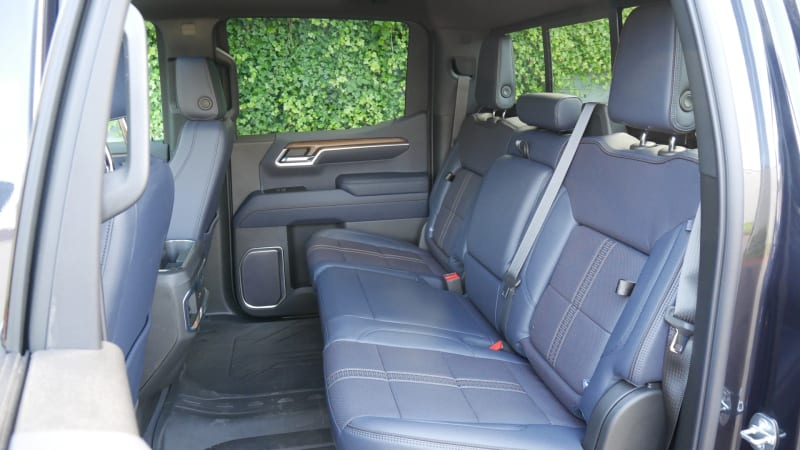
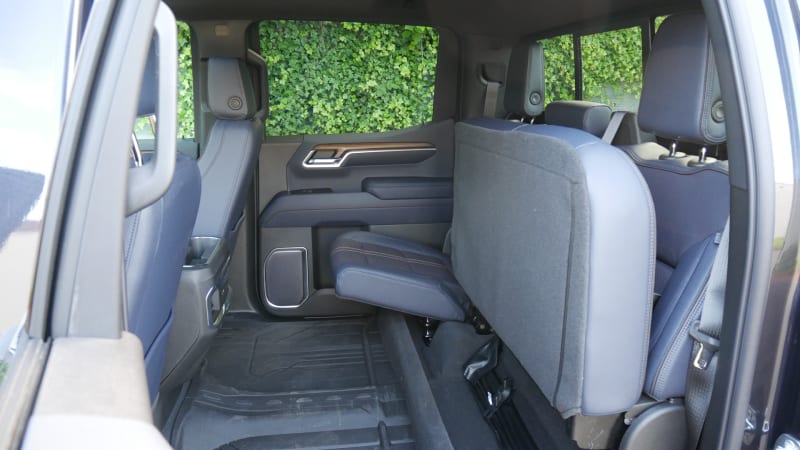
What are the Silverado fuel economy and performance specs?
The Silverado has a sprawling powertrain lineup with four engines, three transmissions and of course 2WD and 4WD. As a result, performance and fuel economy vary widely.
The base engine is a unique 2.7-liter turbocharged inline-four, which produces 310 hp and 420 lb-ft of torque. That’s a massive, 72-lb-ft upgrade beyond the original 2.7-liter and considerably better than the 5.3-liter V8. Paired with an eight-speed automatic, it’s the standard powerplant in most of the mid-range trims and an optional upgrade for the base WT and the Custom. It’s a big step up from the old V6 that used to come in lower trims. The 2.7 feels nice and torquey at around-town speeds, only failing to match the feel of a mid-size V8 at the upper limits of what you’d typically drive on the highway. Buyers should be aware, though, that it definitely doesn’t provide that big, burly sound of a truck engine. Fuel economy is an EPA-estimated 20 mpg combined for 2WD models and 18 mpg combined with 4WD.
Standard on the LTZ and High Country, and optional on lower trims, is a 5.3-liter V8 good for 355 hp and 383 lb-ft of torque. A 10-speed automatic is now standard (there used to be six- and eight-speed options). Unlike in the past, it is only available with GM’s more advanced Dynamic Fuel Management system (DFM). The result is fuel economy that ranges from 16 mpg combined for a Trail Boss with Mud Terrain tires to 19 mpg combined with the 2WD. We’d advise buyers to take a test drive of the 2.7-liter turbo or diesel before deciding to go with the smaller V8.
Speaking of the diesel, the 3.0-liter inline-six is gets a new turbo compressor, piston design, fuel injectors and temperature control features for 2023 that result in an increase in power and torque. Output is now 305 hp and 495 lb-ft of torque. It too is coupled with the 10-speed automatic. Fuel economy ranges from 26 mpg combined with 2WD to 22 mpg combined for a 4×4 mud terrain tire model. That’s as big of a fuel economy advantage as it seems over the other engines, but unfortunately, high diesel prices wipe out any sort of economic advantage. Should they go down, however, you’ll be back to saving money, especially compared to the V8s.
The 6.2-liter V8 is the top-dog offering with 420 horsepower and 460 lb-ft. It too gets the 10-speed. The 6.2 is standard on the ZR2, and optional on the RST, LT Trail Boss, LTZ and High Country. EPA estimates range from 15 mpg combined for those with mud terrain tires to 17 mpg for a more road-going version.
What’s the Silverado like to drive?
We’ve been impressed with the Silverado’s road holding and steering since its last major redesign for 2019. Despite its size, the Silverado is not ponderous to drive. Handling is actually fairly responsive, and it feels nimbler than its rival trucks. The ride quality continues to be a sore spot, however. An LT Double Cab we tested bounded nautically over bumps, while other trims with bigger wheels produce tiresome impact harshness, and there’s some rear axle hop when the bed is unloaded. The top-spec High Country now comes with adaptive dampers that should smooth out the ride at least somewhat, but expect the Ram and F-150 to ride better regardless of version.
We’ve spent just enough miles in Silverados powered by the new 2.7-liter turbocharged four-cylinder engine to feel confident recommending it as a viable alternative to a more traditional V8. It may seem weird and possibly sacrilegious to have a four-cylinder in a full-size pickup, but if you can get past that mental hang up, we think you’ll find it’ll be a solid work horse. That said, we’d probably opt for the Duramax diesel. For starters, it’s shockingly quiet – both inside and, most surprisingly, outside. You’d be hard pressed to tell it’s not a gas burner until you lay into the throttle and discover all that low-end torque. Diesel fuel prices may wipe out any sort of cost savings at the pump you would’ve enjoyed in the past (and may enjoy in the future), but there’s enough benefit here to still consider it a net gain over the 2.7 and 5.3 liter gas engines.
Now, as for the V8s, the mid-level 5.3-liter is a fine engine that pairs well with its 10-speed automatic, but is ultimately unremarkable considering the other engines offered as well as those of rival trucks. The bigger 6.2-liter most definitely does feel significantly more powerful than any of the smaller engines — it’s rated at a stout 420 horsepower and 460 lb-ft of torque — and works very well with its standard 10-speed auto. Most buyers won’t truly need the extra power of the bigger V8, but for those who do plan to tow heavy loads, it’s a good option.
Shifting gears (or transfer cases), let’s touch on the Silverado’s various off-roader trim levels. An off-road stint in the Trail Boss showcased its mud-slogging capabilities, although those come at a cost to on-road comfort. The Trail Boss is a solid off-roader, available in two trim levels no less (Custom and LT), but buyers looking for the ultimate Bowtie-badged off-road pickup truck will want to check out the Silverado ZR2. It features excellent Multimatic DSSV shocks and boasts an approach angle of 31.8 degrees, a breakover angle of 23.4 degrees, and a departure angle of 23.3 degrees. Those are class-competitive figures that allow the ZR2 to tackle the same kind of off-road terrain that Ford Raptor buyers have had access to for years. But the ZR2 doesn’t get an upgraded powerplant; the standard 6.2-liter V8 is the same as in any other Silverado.
What other Chevy Silverado reviews can I read?
2022 Chevy Silverado ZR2 First Drive | Raptor rival? More like an alternative
We break down all the upgrades that make the new-for-2022 Silverado ZR2 more capable off of pavement than any other truck in Chevy’s stable. It’s priced similarly to the Ford, but doesn’t match up spec-for-spec with the segment-defining Ford Raptor. It instead stands separate as an alternative that ought to be easier to live with on a daily basis.
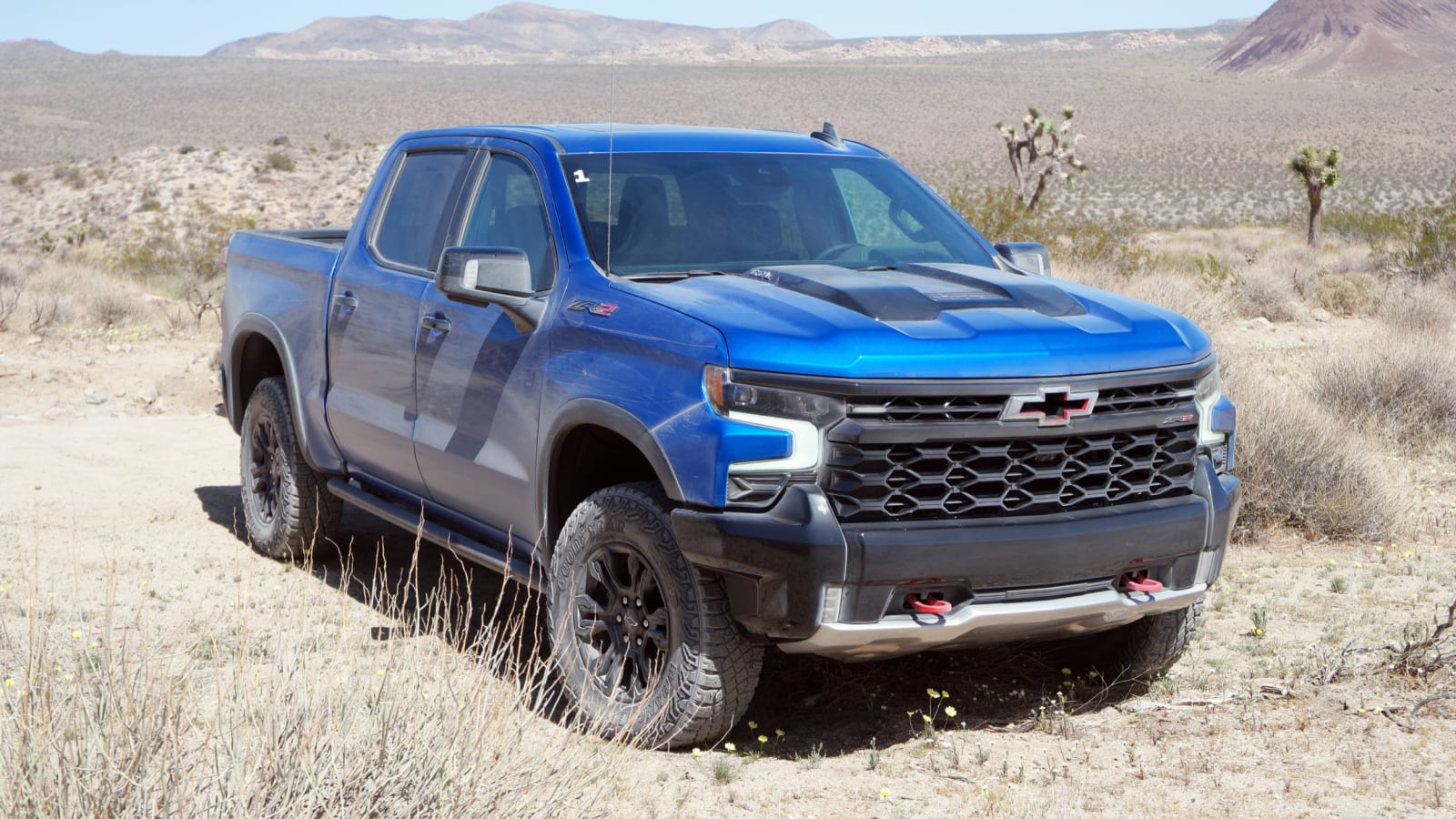
2020 Chevrolet Silverado 1500 Duramax First Drive Review
Here’s our most comprehensive review of the Silverado when fitted with the Duramax diesel engine. Although it can tow significantly more for 2022, that’s due to the availability of the Max Tow package as opposed to actual changes with the engine.

2019 Chevrolet Silverado LT Double Cab Review
This is our only test of a Double Cab Silverado, so it’s still worth a look even though the truck’s LT trim level and 2.7-liter engine have both been significantly updated since this was published.

2020 Chevy Silverado Trail Boss Off-Road Review
We take the most off-road-oriented Silverado 1500 off-road, finding it to be plenty capable but with a few compromises.
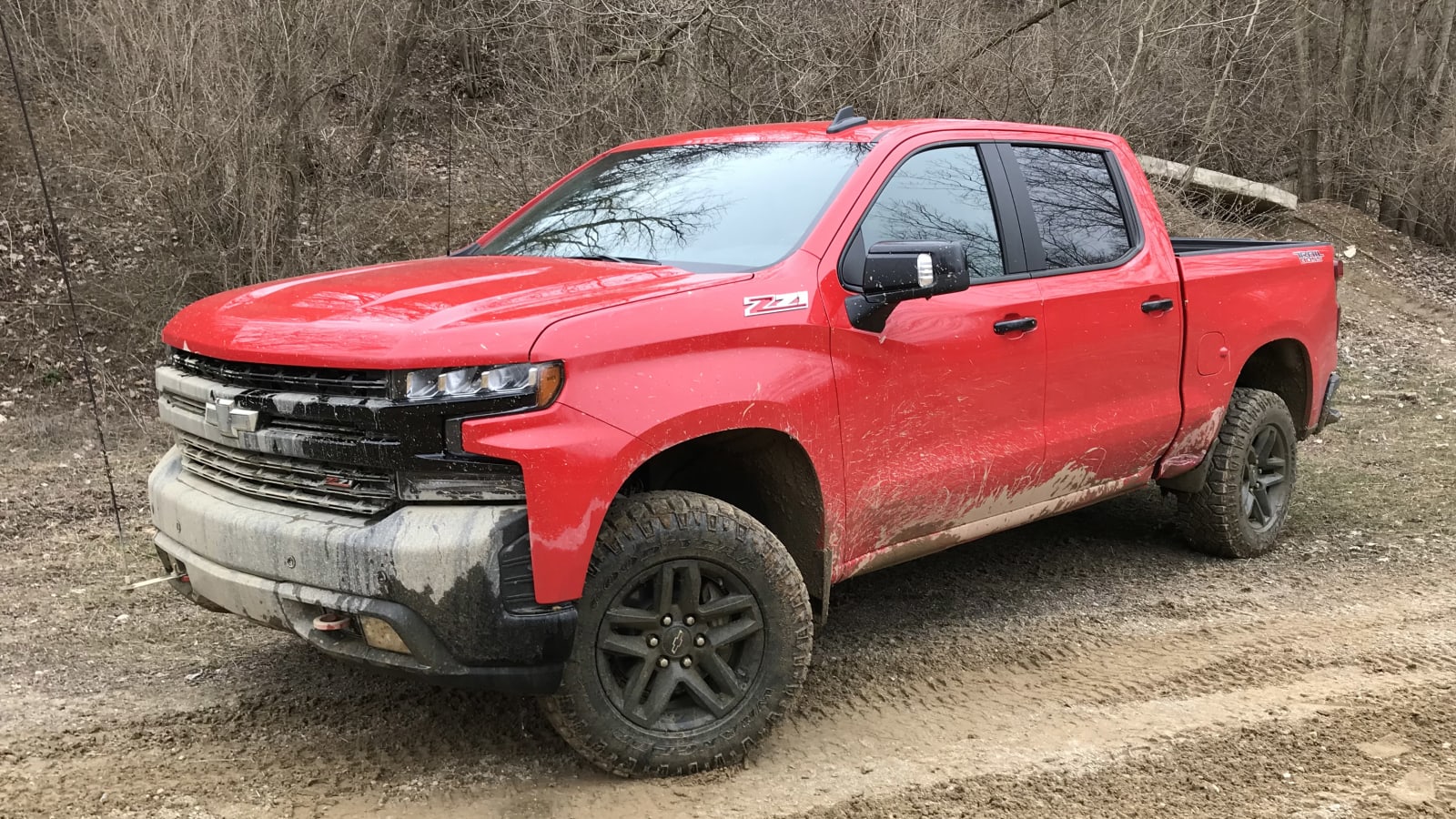
2019 Chevrolet Silverado 1500 First Drive Review
Here is our more comprehensive review of the 5.3- and 6.2-liter V8 engines, including while towing. We also provide in-depth details about the new Silverado’s overall engineering and design.
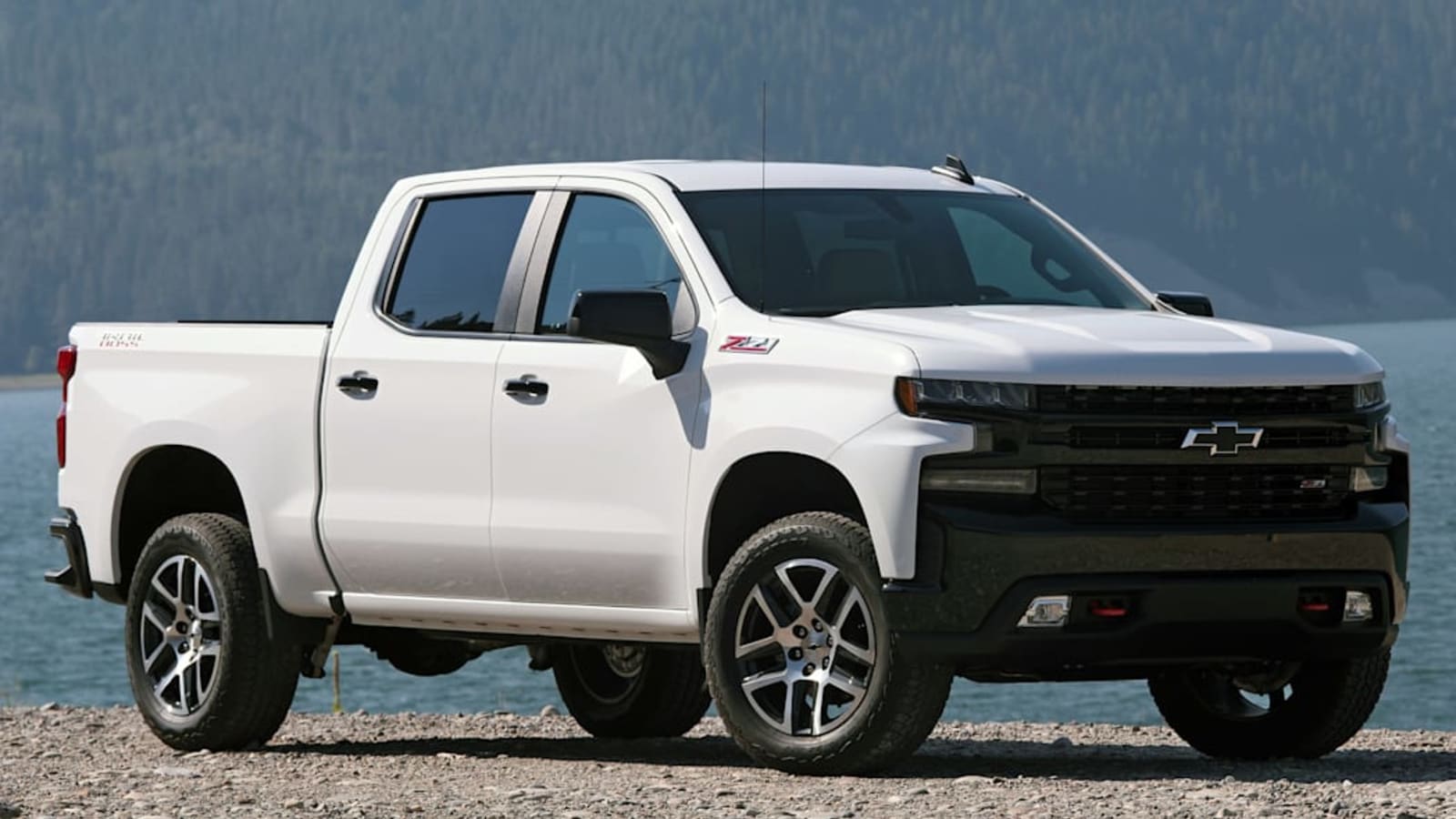
What is the 2023 Silverado price?
Prices have gone up by more than $4,000 for 2023, including an also-higher destination charge of $1,895. Ka-ching. The difference gets higher with higher trim levels. You can find a more comprehensive rundown of each trim level, including added standard features and the prices of various cab, bed and drivetrain combinations here at Autoblog.
All prices below are the cheapest price each trim level is available. We have separated the off-road-oriented trucks, which come standard with four-wheel-drive and various mechanical upgrades. The others come standard with rear-wheel-drive.
Work Truck: $38,195
Custom: $45,495
LT: $49,895
RST: $54,195
LTZ: $59,095
High Country: $63,995
Custom Trail Boss: $53,695
LT Trail Boss: $59,895
ZR2: $73,395
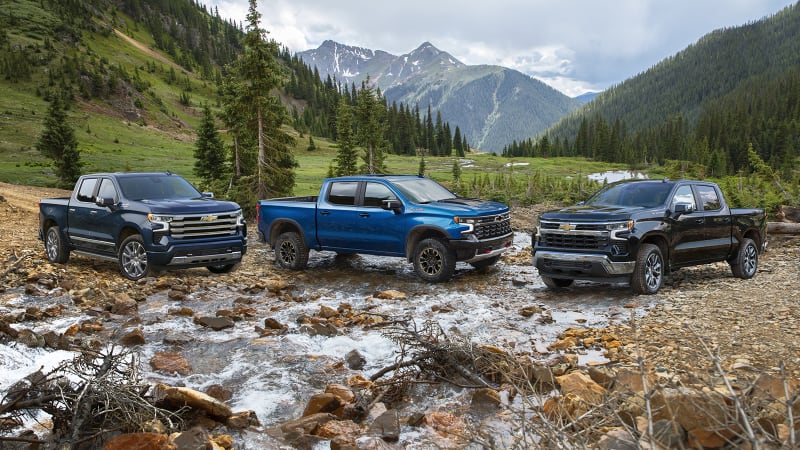
What are the Silverado safety ratings and driver assistance features?
All 2023 Silverados come standard with automatic emergency braking with pedestrian detection, lane-keep assist and automatic high beams. The High Country is available with Super Cruise, and is the only trim on which it’s offered. It also operates with a trailer, and it can execute lane changes.
The NHTSA gave the Silverado Crew Cab a five-star overall crash rating (out of five stars), along with a four-star frontal rating and five-star side crash rating. The Regular and Extended cabs were only tested for side protection and they too got five stars. The Insurance Institute for Highway Safety gave the Silverado the best possible score of “Good” in all but the “small overlap front: passenger side” test where it got a third-of-four “Marginal” score.
:



